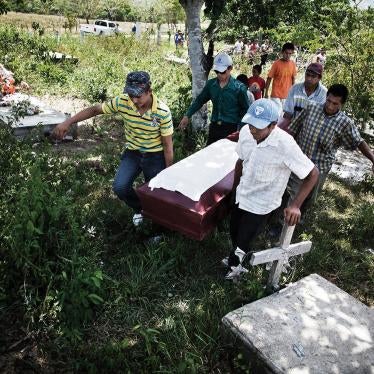(Washington, DC) – The decision by Honduras’s Attorney General’s Office to create a special unit to investigate killings allegedly linked to land disputes in the Bajo Aguán region is an important step toward tackling widespread impunity there, Human Rights Watch said today.
Human Rights Watch called for such a unit in its February 2014 report titled “There Are No Investigations Here.” Human Rights Watch documented the systemic failure of Honduran authorities to properly investigate a wave of killings and other abuses believed to be tied to land disputes in Bajo Aguán.
“The creation of the special prosecutor’s unit is an encouraging move by the Attorney General’s Office toward tackling the longstanding violence without accountability in Bajo Aguán,” said José Miguel Vivanco, Americas director at Human Rights Watch. “The true measure of these efforts will be how effective the unit is in bringing those responsible for killings and abuses to justice – something their predecessors didn’t do in a single case.”
The unit, announced on February 27 by Attorney General Óscar Chinchilla, will consist of investigative experts, prosecutors, and members of the national police. It will be responsible for investigating 147 homicides at its outset, and will pursue allegations that landowners in Bajo Aguán have been responsible for some crimes, Chinchilla said. The director of the national police, Ramón Sabillón, pledged to carry out lawful and efficient investigations.
The Bajo Aguán region of northern Honduras has been the setting for long running, often violent land disputes, many stemming from changes to the country’s agrarian law in 1992. Large tracts of territory in the region have been contested between groups of campesinos (small-scale farmers) and agro-industrial businesses that mostly cultivate African palm oil.
Human Rights Watch examined 29 homicides and two abductions in Bajo Aguán since 2009, as well as alleged human rights violations by soldiers and police, none of which has led to a conviction. Prosecutors and police consistently failed to carry out prompt and thorough investigations into these crimes.
A key recommendation by Human Rights Watch was for the government to create a special investigative unit with a multi-year mandate. The recommendation was for the unit to conduct prompt, thorough, and impartial investigations into homicides, abductions, and other serious crimes in Bajo Aguán in which evidence suggests a connection to the land conflict, as well as all cases of alleged human rights violations by authorities in the region.
It is not clear whether the new unit will take on investigations into human rights abuses implicating security forces in Bajo Aguán, including torture, excessive use of force, and forced evictions that Human Rights Watch documented. These investigations have also been marked by serious flaws and should be taken up by the new unit, Human Rights Watch said.
Victims and their families in Bajo Aguán have had very limited contact with justice officials and receive little information about investigations, Human Rights Watch said. This lack of transparency infringes on the rights of victims under Honduran law to be informed of the results of investigations while they are in progress.
“It’s critical for the new unit to keep victims’ families informed and involved in its investigations, rather than keeping them in the dark, as in the past,” Vivanco said.







